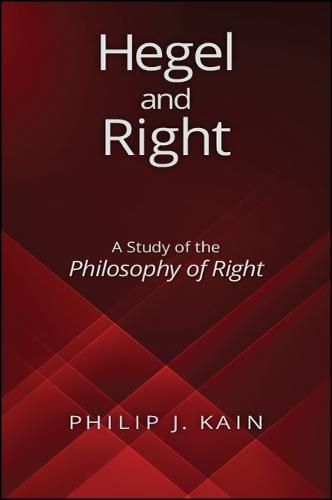Readings Newsletter
Become a Readings Member to make your shopping experience even easier.
Sign in or sign up for free!
You’re not far away from qualifying for FREE standard shipping within Australia
You’ve qualified for FREE standard shipping within Australia
The cart is loading…






This title is printed to order. This book may have been self-published. If so, we cannot guarantee the quality of the content. In the main most books will have gone through the editing process however some may not. We therefore suggest that you be aware of this before ordering this book. If in doubt check either the author or publisher’s details as we are unable to accept any returns unless they are faulty. Please contact us if you have any questions.
In this book, Philip J. Kain introduces Hegel’s Philosophy of Right by focusing on disagreements, both with standard interpretations of his work and with Hegel himself. Arguing that Hegel’s justification for punishment ultimately fails, Kain shows how this failure brings into focus the inherent difficulties in justifying punishment at all, thus producing a valuable Hegelian argument against punishment. Whereas many of Hegel’s critics have argued that he misunderstands Kant’s categorical imperative, Kain argues the opposite: that Hegel has a sophisticated understanding of it and simply attempts to provide a broader ethical context for Kant’s position. In addressing these and other questions, such as whether Hegel’s theory of recognition, properly understood, can provide philosophical support for same-sex marriage, and whether supporting monarchy over democracy means that Hegel seeks less rather than greater power for the state, Kain makes Hegel’s work more approachable by drawing out philosophical points of independent importance.
$9.00 standard shipping within Australia
FREE standard shipping within Australia for orders over $100.00
Express & International shipping calculated at checkout
This title is printed to order. This book may have been self-published. If so, we cannot guarantee the quality of the content. In the main most books will have gone through the editing process however some may not. We therefore suggest that you be aware of this before ordering this book. If in doubt check either the author or publisher’s details as we are unable to accept any returns unless they are faulty. Please contact us if you have any questions.
In this book, Philip J. Kain introduces Hegel’s Philosophy of Right by focusing on disagreements, both with standard interpretations of his work and with Hegel himself. Arguing that Hegel’s justification for punishment ultimately fails, Kain shows how this failure brings into focus the inherent difficulties in justifying punishment at all, thus producing a valuable Hegelian argument against punishment. Whereas many of Hegel’s critics have argued that he misunderstands Kant’s categorical imperative, Kain argues the opposite: that Hegel has a sophisticated understanding of it and simply attempts to provide a broader ethical context for Kant’s position. In addressing these and other questions, such as whether Hegel’s theory of recognition, properly understood, can provide philosophical support for same-sex marriage, and whether supporting monarchy over democracy means that Hegel seeks less rather than greater power for the state, Kain makes Hegel’s work more approachable by drawing out philosophical points of independent importance.